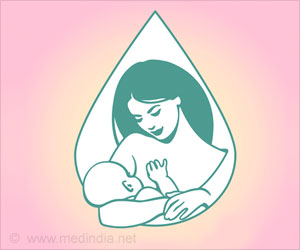Breastfeeding is a cost efficient and healthy behavior that decreases a woman’s risk for postpartum depression.
- Breastfeeding can help reduce risk of postpartum depression in mothers
- Women with postpartum depression who are not treated have difficulty in bonding with the child
- Postpartum depression increases maternal morbidity and is associated with increased risks for cardiovascular disease, stroke and type-2 diabetes
- Increasing the number of breastfeeding weeks, also helps in decreasing the risk of postpartum depression
Current biological and psychosocial models of breastfeeding suggest that breastfeeding could possibly reduce a woman’s risk for postpartum depression. However, prior studies only have looked at the initiation of breastfeeding and breastfeeding length.
In addition, small and often homogenous samples have yielded ungeneralizable results lacking in statistical power with biased results due to higher levels of education, income, and proportions of white participants compared to the general population of the sampled country.
Researchers from Florida Atlantic University’s Christine E. Lynn College of Nursing and collaborators are the first to examine current breastfeeding status in association with postpartum depression risk using a large, national population-based dataset of 29,685 women living in 26 states.
Results of the study, published in the journal Public Health Nursing, demonstrate that postpartum depression is a significant health issue among American women with nearly 13 percent of the sample being at risk.
In addition, there is a statistically significant inverse relationship between breastfeeding length and risk of postpartum depression. As the number of weeks that women breastfed increased, their postpartum depression decreased
“Women suffering from postpartum depression, which occurs within four weeks and up to 12 months after childbirth, endure feelings of sadness, anxiety and extreme fatigue that makes it difficult for them to function,” said Christine Toledo, Ph.D., senior author and an assistant professor in FAU’s Christine E. Lynn College of Nursing.
“Women with postpartum depression who are not treated also may have negative outcomes, including difficulty bonding with and caring for their children, thoughts of harming themselves or their infant, and also are at an increased risk of substance misuse.”
Woman who have experienced postpartum depression have a 50 percent increased risk of suffering further episodes of postpartum depression in subsequent deliveries.
In addition, they have a 25 percent increased risk of suffering further depressive disorders unrelated to childbirth up to 11 years later.
Postpartum depression increases maternal morbidity and is associated with increased risks for cardiovascular disease, stroke and type-2 diabetes.
For the study, Toledo and collaborators from the University of Miami School of Nursing and Health Studies, University of North Carolina School of Nursing, Chapel Hill, Seattle University of Nursing, and The University of British Columbia School of Nursing, analyzed dataset from the 2016 Pregnancy Risk Assessment Monitoring System (PRAMS) questionnaire to investigate the association of breastfeeding practices taking into consideration significant covariates such as age, race, marital status, education, abuse before and during pregnancy, cigarette smoking, among others.
“Findings from this important study suggest that breastfeeding is a cost efficient and healthy behavior that can decrease a woman’s risk for postpartum depression,” said Safiya George, Ph.D., dean, FAU Christine E. Lynn College of Nursing.
“Nurses in particular play an important role in educating and promoting both the maternal health benefits of breastfeeding and infant benefits such as providing necessary nutrients and protecting them against allergies, diseases and infections.”
Study co-authors are Rosina Cianelli, Ph.D.; Giovanna De Olivera, Ph.D.; and; Karina Gattamorta, Ph.D., all with the University of Miami School of Nursing and Health Studies; Natalia Villegas Rodgriguez, Ph.D., University of North Carolina School of Nursing, Chapel Hill; Danuta Wojnar, Ph.D., Seattle University of Nursing; and Emmanuela Ojukwu, Ph.D., The University of British Columbia School of Nursing.
The study was funded by the Ph.D. Scholarly Award by the Sigma Theta International, Beta Tau Chapter.
Source-Eurekalert
















